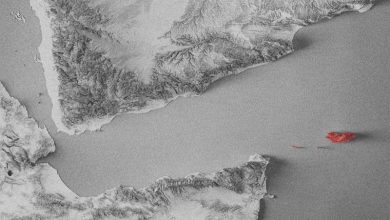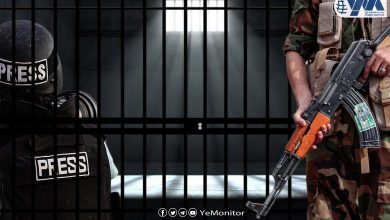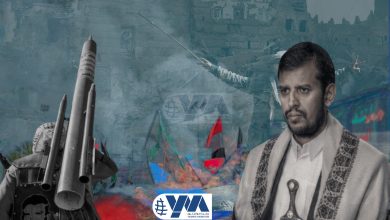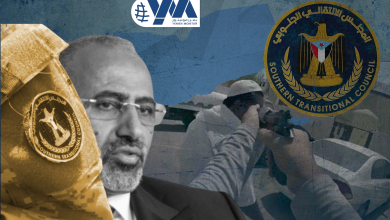Yemeni Think Tank: Red Sea Attacks Shifted Popular Pressures from Houthis
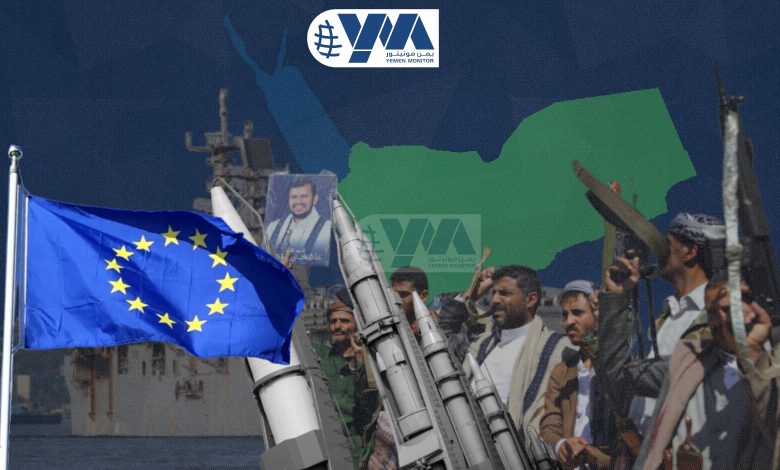
Yemen Monitor/Newsroom
A Yemeni research center has said that the Red Sea attacks have cast multiple shadows on the Presidential Leadership Council in Yemen, while removing popular pressures from the Iranian-backed Houthi group, most notably in paying the salaries of government employees, and have also contributed to freezing the political settlement track prepared by Saudi Arabia based on its negotiations with the Houthis.
The analytical paper, issued by “Makha Center for Strategic Studies” (Yemeni Research Center), dealt with the challenges that have faced the council during the past two years with a number of complex files, especially those related to the Red Sea events and the economic challenges that have been exacerbated by the Houthi group’s ability to prevent them from exporting oil, and the decline in support provided by the “Arab coalition” countries, as well as its position in the peace negotiations that have been organized between Saudi Arabia and the Houthi group, and its ability to build a cohesive vision of its own to deal with the potential peace entitlements, and other files.
The paper touched on the divergent relationship between the eight members of the council and the components they represent, as the state of harmony that its members were keen to show at the time of its formation did not last long, and contradictions soon emerged between them over several files.
The paper considered the failure to merge the military formations under the ministries of defense and interior to be one of the most important aspects of the failure of the Presidential Leadership Council’s performance. It is also a strategic threat to any gains that the council may achieve, and even makes the future of the relationship between its components fraught with the risk of slipping into armed conflict.
The paper pointed out that the council was completely absent from the peace negotiations – as informed sources indicated – except that the Saudi leadership was informing the head of the council – from time to time – about some of the details of those negotiations, so that the council’s position seemed embarrassing, and it appeared as if it was in a state of complete dependence on Saudi Arabia, which negotiates on its behalf, and does not have anything to do with its own affairs.
On the economic level – the paper says – the Presidential Leadership Council has faced – during the past two years – great economic difficulties that represented a serious challenge to it, as the resources that were in the hands of the legitimate authority declined significantly, as the Houthis attacked – in October 2022 – oil export ports in Shabwah and Hadramout, and were able to prevent the legitimate government from exporting, as well as the truce that came with the formation of the Presidential Leadership Council led to the transfer of the conflict with the Houthis to a new stage, namely “the war of economic resources.”
The failure of the “coalition” countries to fulfill the level of economic support that they promised at the birth of the council, as Riyadh and Abu Dhabi had announced their commitment to provide three billion dollars in support of it, but they hesitated after that to fulfill those commitments, which contributed to the exacerbation of the economic crisis in the areas controlled by the legitimate authority.
The economic crisis has led to various repercussions, as it has expanded the scope of popular discontent with the policies of the Leadership Council and its government, and a major decline in its legitimacy. On the other hand, it has also contributed to forcing the “Transitional Council” to alleviate its excesses and accept the role of the council and government in dealing with this crisis.
The paper explained that the Red Sea attacks cast multiple shadows on the Presidential Leadership Council. On the one hand, it led to a relative change in the international position on the conflict in Yemen, and helped to draw the attention of the international community to the dangers of the rise of Houthi influence, and to the damage that could be caused to regional security and international interests, and pushed for more international support for the legitimate government and the Presidential Leadership Council. The most prominent impact of these attacks – according to the paper – is the freezing of the political settlement track, as the Yemeni parties were on the verge of signing a peace map prepared by Saudi Arabia based on its negotiations with the Houthis.
On the other hand, the paper believes that the Red Sea attacks have removed popular pressures from the Houthis, as the truce that lasted for two years put the Houthis in a direct confrontation with popular demands, most notably paying the salaries of government employees. The Red Sea attacks also provided the Houthis with a new banner for military mobilization for sectors of Yemeni society and youth, under claims of military participation in the war in Gaza.
These attacks have also doubled the economic difficulties in the areas of the legitimate government and Yemen in general, as they have caused insurance fees on Yemeni ports to rise to five or six times, shipping fees to rise to eight times, and this has been reflected in the rise in the prices of goods and services;
The paper recommended that the Council, after missing the opportunity to receive support from the international community, contribute to changing the military balance in the country, amidst the growing belief of the active international parties in the failure of relying on political action to find a solution to the conflict in Yemen. It should adopt a clear vision in this regard, demonstrate a coherent position, and translate that into many aspects, including advancing the integration of military formations under the command of the Ministries of Defense and Interior.
The paper also stressed to the international community that investing in the Presidential Leadership Council – despite its real weaknesses – is the shortest and safest way to achieve permanent stability in Yemen, security for the region, and protection of international interests. Since the Leadership Council is under the direct influence of the “coalition” states, it is imperative for the international parties to exert pressure on them to ensure greater cohesion and effectiveness for the Council.

